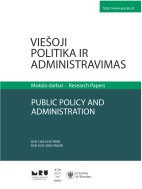Urban Settlement and Behavioural Exchange towards Environmental Policy among Urban Settlers in Southeast Nigeria: Implications for Environmental Policy Administration and Sustainability
Urban Settlement and Behavioural Exchange towards Environmental Policy among Urban Settlers in Southeast Nigeria: Implications for Environmental Policy Administration and Sustainability
Author(s): Samuel O. Okafor, Edwin M. C. Izueke, Ifeoma Nzekwe, Obara Okezi, Abdulrouf IsahSubject(s): Energy and Environmental Studies, Public Administration, Rural and urban sociology
Published by: Mykolas Romeris University
Keywords: Nigeria; cities; public administration; environmental pollution and protection; environmental sustainability; policy sustainability;
Summary/Abstract: Environmental pollution as well as sustainability of the natural environment is the product of behavioural exchange obtainable in a particular geographical setting and time space. Each environmental setting has its own expected behavioural disposition making it, more or less the symbolic identity of the people living in the setting. In southeast Nigeria among the six geopolitical zones of the country, environmental pollution has appeared as identity for many cities over the years. While some scholars have scratched the matter from other dimensions, there is yet to be research design, targeting the essence of symbolic behavioural exchange in the understanding of the issue of urbanites and environmental pollution. From the theoretical framework of symbolic interactionism, a coherent analysis was advanced in this study, to capture the behavioural exchanges towards the natural environment between the urbanites and the government institutions implementing environmental protection policies. This was substantiated through the primary data obtained via survey research design, involving 640 respondents (18+) from the southeast Nigerian cities. The study adopted descriptive statistics as well as linear model in probing the data collected. According to the findings of the study, weak policy framework and implementation elicited covert anti-environmental protection behaviour. Commitment to environmental protection, policy awareness and support to government policy and institution are dependent on the public trust of the government institutions managing the environment, awareness of environmental issues, government policies and the functionality of the government institutions managing environmental issues.
Journal: Viešoji politika ir administravimas
- Issue Year: 21/2022
- Issue No: 1
- Page Range: 55-81
- Page Count: 27
- Language: English

